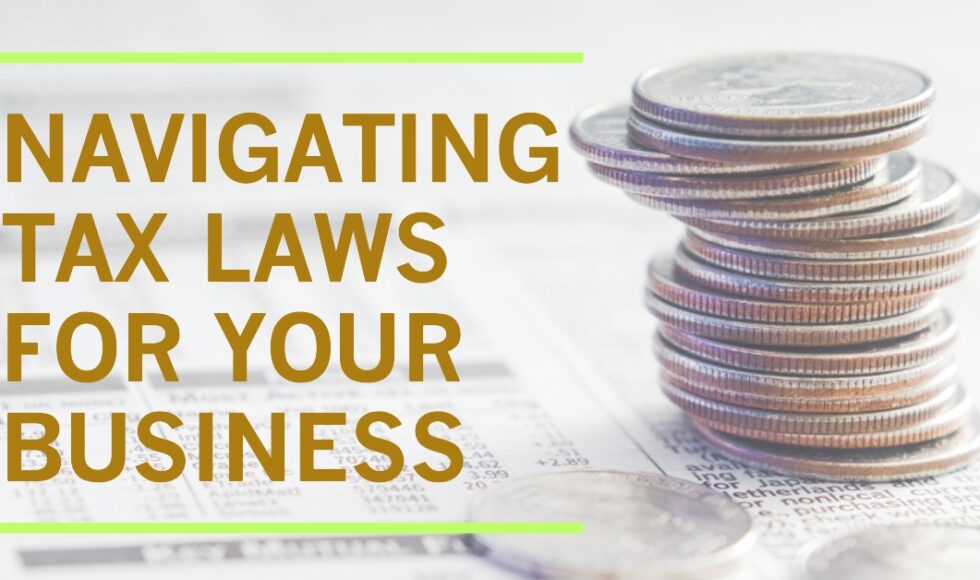You, brave business owner, are about to embark on a thrilling adventure. A journey through the treacherous realm of tax laws. Don’t worry, we’ve got your back. We’ll guide you through the labyrinth of rules and regulations, ensuring your business stays on the righteous path of compliance.
Oh, the impact of tax laws on your business is like a never-ending roller coaster ride. One wrong move, and you’ll be plummeting into a world of penalties and audits. But fear not, dear entrepreneur, for we shall equip you with the knowledge to navigate this perilous landscape.
From deciphering deductions to minimizing your tax liability, we’ll help you conquer the tax dragon and emerge victorious. So buckle up, my friend, and let’s embark on this wild tax adventure together. Safety first, of course.
Tax Obligations and Compliance
To ensure compliance with tax laws, you must adhere to your business’s tax obligations. Oh, tax obligations, what a thrilling topic! I can practically see you on the edge of your seat, eagerly waiting to learn more. Well, buckle up, my safety-conscious friend, because we’re about to embark on a wild ride through the world of tax audits and tax planning.
Let’s start with tax audits. Ah, the joy of having your financial records scrutinized by the tax authorities. But fear not, for if you have been diligently keeping track of your income and expenses, and accurately reporting them, you should have nothing to worry about. Just remember to keep those receipts handy and maintain organized records. Safety first, after all!
Now, onto tax planning. It’s like a strategic game of chess, where you strategize to minimize your tax liability legally. You want to make sure you’re taking advantage of all applicable deductions and credits, while avoiding any unnecessary risks. It’s all about finding that perfect balance between saving money and staying on the right side of the law.
Impact on Business Operations
Tax laws have a significant impact on how your business operates. It’s like having an unwanted guest at your dinner party – they may not be the life of the party, but you have to accommodate them anyway. When it comes to tax planning, you have to navigate through a maze of rules and regulations that seem to change as often as the weather. It’s a delicate dance, balancing your financial goals with the ever-watchful eye of the taxman.
But wait, there’s more! Just when you thought you’d it all figured out, along comes the dreaded tax audit. It’s like being called to the principal’s office, except scarier because you’re dealing with your hard-earned money. The auditors scrutinize every nook and cranny of your business, looking for any discrepancies or errors. It’s like having a microscope on your finances, magnifying every little detail.
So, how do you survive this tax law circus? Well, it all starts with careful tax planning. Stay informed, consult with experts, and make sure your business is in compliance with all the necessary regulations. Don’t give the taxman any reason to come knocking on your door. And if they do, don’t panic. Be prepared, keep your records organized, and work with a professional to navigate the audit process smoothly.
Understanding Deductions and Credits
As a business owner, you must familiarize yourself with the intricacies of deductions and credits to optimize your tax planning strategies. I know, I know, tax planning mightn’t sound like the most thrilling topic, but hey, it’s all about maximizing benefits, right?
So let’s dive into the world of deductions and credits and uncover the secrets to keeping more of your hard-earned money.
First up, deductions. These little gems allow you to subtract certain expenses from your taxable income. Think of them as your business’s secret weapon against Uncle Sam. From office supplies to advertising costs, deductions can help lower your overall tax liability. Just make sure you keep meticulous records to support your claims. Safety first, folks!
Now, let’s talk about credits. Unlike deductions, which reduce your taxable income, credits directly reduce your tax bill. It’s like finding a twenty-dollar bill in your pocket when doing laundry – except it’s way better because it’s money you don’t have to give to the government. So, take advantage of all the credits available to you, whether it’s for hiring veterans or investing in renewable energy.
Understanding deductions and credits is crucial for any savvy business owner. So, grab your calculator, put on your tax-deductible superhero cape, and start maximizing those benefits. Your tax planning strategies will thank you.
Strategies for Minimizing Tax Liability
Now let’s explore some effective ways you can minimize your business’s tax liability. Because who doesn’t love paying less in taxes, am I right?
So here’s the deal: tax planning is key. It’s like a secret weapon that can help you navigate the complex world of tax laws and regulations. And trust me, you want all the help you can get.
One strategy is to take advantage of tax incentives. These little gems are like gifts from the tax gods, designed to encourage certain behaviors or investments. They can come in the form of deductions, credits, or even exemptions. So make sure you do your homework and find out which incentives apply to your business. It’s like finding a secret treasure map that leads to a pot of gold (or at least a pot of tax savings).
Another strategy is to be proactive. Don’t wait until tax season to start thinking about your tax liability. Plan ahead, strategize, and make smart decisions throughout the year. Keep track of your expenses, maximize your deductions, and explore any potential loopholes (legally, of course). It’s like playing a game of chess with the taxman, always thinking three steps ahead.
So there you have it, my safety-conscious friend. By engaging in tax planning and taking advantage of tax incentives, you can minimize your business’s tax liability and keep more money in your pocket. It’s like a safety net for your finances, ensuring that you’re prepared for whatever tax surprises may come your way.
Happy tax saving!
Long-Term Financial Planning and Tax Implications
To ensure the long-term financial stability of your business, it’s vital to consider the implications of tax laws and incorporate them into your strategic planning. Now, I know what you’re thinking. ‘Tax laws? Strategic planning? How thrilling!’ But bear with me, because understanding the long-term financial implications of taxes can actually be quite exciting.
Let’s start with retirement savings. Ah, retirement, the golden years when you can finally relax and sip margaritas on a beach somewhere. But before you get too carried away with daydreams, it’s important to think about how taxes will impact your retirement savings. By strategically planning for tax deductions and utilizing retirement accounts like 401(k)s and IRAs, you can ensure that your savings grow tax-free and you can retire in style.
Now, let’s talk about estate planning. I know, it’s not the most thrilling topic, but it’s oh-so-important. You’ve worked hard to build your business, and you want to ensure that it continues to thrive even after you’re gone. By considering the tax implications of your estate plan, you can minimize the tax burden on your loved ones and ensure that your hard-earned assets are passed down smoothly.
Conclusion
So, now that you’ve waded through the murky waters of tax laws and their impact on your business, it’s time to take action.
Remember, navigating the tax landscape is like trying to untangle a slinky that’s been tied in knots by a mischievous kitten.
But fear not! With a little creativity, savvy deductions, and a solid long-term plan, you can minimize your tax liability and keep your business thriving.
Happy tax season, you clever financial wizards!

